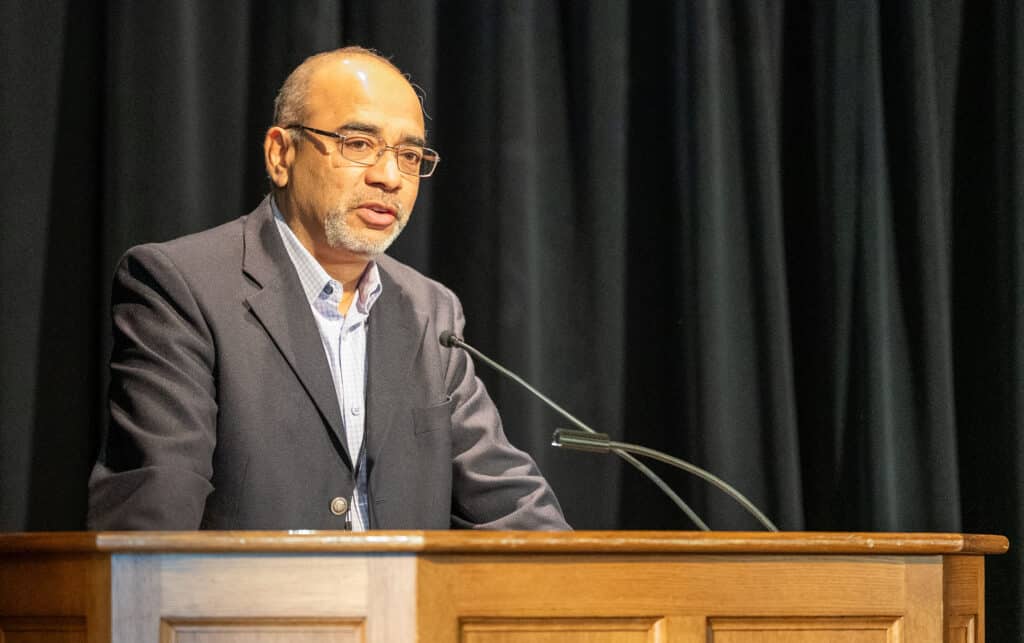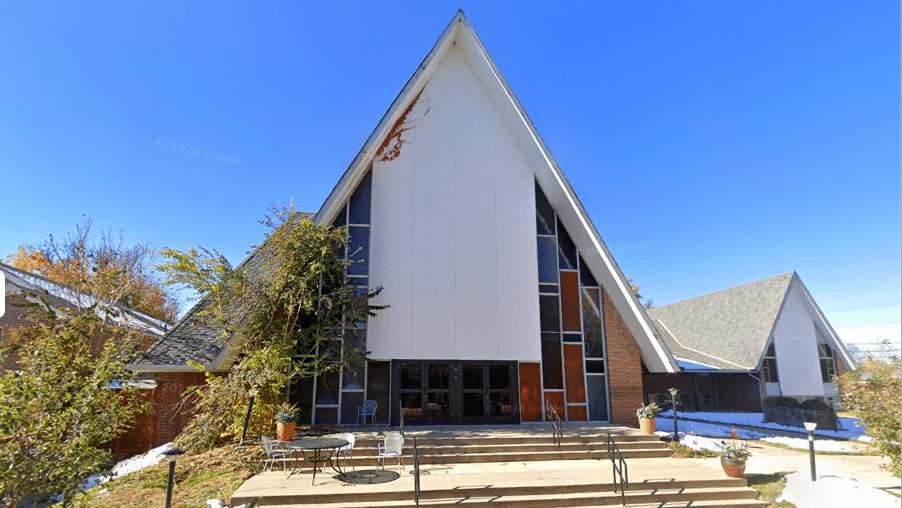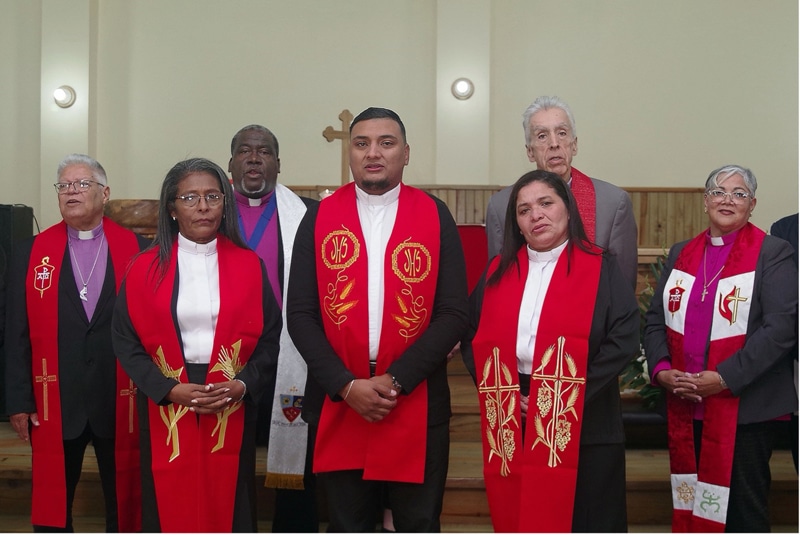“The needs of this moment are many, and we need to do all we can to
respond.” – Roland Fernandes, General Secretary
ATLANTA — In his address to the joint boards of Global Ministries and the General Board of Higher Education and Ministry (GBHEM), General Secretary Roland Fernandes affirmed a sacred calling to respond “for such a time as this,” referencing Esther 4:14. Against a backdrop of global instability, humanitarian crises and shifting political landscapes, Fernandes outlined progress on the agencies’ faith-based response in five areas of special focus: education, agriculture and food security, health, concern for migrants, and promotion of peace and justice. He also updated the boards on partner consultations, as well as agency and staff alignment work. The boards are meeting jointly on Zoom from Oct. 8-10.
Fernandes painted a sobering picture of the current global context. The 90% reduction in the U.S. foreign aid budget is leading to catastrophic consequences, with an estimated 460,000 deaths reported by mid-2025, including 317,000 children. Projections estimate 14 million deaths by 2030, due to the dismantling of USAID programs. Neither Global Ministries nor GBHEM receives U.S. federal funding.
The agencies are attempting to help bridge some of the huge gaps left by the elimination of both domestic and international funding. Actions already taken include $9 million in grants made since last spring, many for health and food security needs in Africa. Fernandes requested that the boards set aside or reallocate additional agency funds to provide ongoing support for the five areas of special granting. The church agencies’ response to shifting U.S. and global priorities concerning human need is rooted in the biblical affirmation of the “value and worth of every individual, regardless of their background,” Fernandes said, calling that affirmation a central tenet of Methodist belief. “This is God’s work; it is sacred work,” he noted.
Areas of recent work
Fernandes highlighted some of the recent work undertaken so far in the U.S. and throughout the world – much of it with ecumenical partners – across the five focus areas:
Education: Higher Education and Ministry is working with various United Methodist-affiliated educational institutions to develop virtual convening spaces called “Holy Conversations” for college/university chaplains to focus on best practices in trying times. Work has been done to articulate the United Methodist identity of affiliated institutions. The agencies are closely monitoring federal education policy through partnerships with organizations like NAICU.
Migration: Major grants related to migration, primarily through UMCOR, have supported the work of Church World Service (CWS), and the Immigrant Law and Justice Network (ILJN). With UMCOR’s support, CWS has provided critical services to recently arrived refugees and immigrants in the United States after the abrupt suspension of the U.S. Refugee Admissions Program, unprecedented delays in payment reimbursements, and the gutting of legal and social services nationwide assisting immigrants. The grant to ILJN was distributed to local affiliate offices affected by the termination of federal immigrant child legal defense contracts. ILJN is currently exploring ways to facilitate the cases of children who no longer have legal representation in immigration proceedings.
In Argentina, CAREF has received grant funds from UMCOR to continue its work supporting migrant rights amid growing challenges. CAREF reports that this support has allowed them to sustain and strengthen the work they carry out in an increasingly challenging and overwhelming context regarding the reception, integration and guarantee of rights for migrants.
Global Health: Over $3.5 million in grants made since April have impacted more than 1 million beneficiaries. The work is being done through grants to both established and new partners in 12 countries, including two to the United States. There has been strong emphasis on maternal newborn and child health but also on HIV, malaria, tuberculosis and nutrition programming. Fernandes noted, “We see vulnerable communities – those that are least able to advocate for themselves and are most directly impacted by the cuts – being supported in crucial ways, but so much still needs to be done.”
A four-year MOU is allowing Africa University, the United Methodist-related school in Zimbabwe, to restart a malaria program shut down by the loss of USAID funding and is supporting work around sustainable agriculture. Fernandes expressed his hope “that Africa University will serve as a far-reaching training ground for both health and agriculture programming, strengthening our presence and partnerships on the African continent.”
Food Security and Nutrition: Since 2020, 41 Yambasu Agriculture Initiative grants totaling $9.9 million have been awarded to 22 episcopal areas and one institution. In a new initiative concerning health, food security and nutrition, Global Health and the Yambasu Agriculture Initiative (YAI) are working together to assist vulnerable communities where pregnant women and young children are at risk or already diagnosed with malnutrition. The three pilot projects in North Katanga, Central Congo and Sierra Leone will serve communities that are also supported by UMC health facilities. YAI will work on food security and livelihoods aspects, and the Global Health unit will complement that work by training community health workers on health education, nutrition and nutritional rehabilitation. Water, sanitation and hygiene (WASH) interventions are included in the projects as needed.
An MOU, with Katanga Methodist University brings together education and food security efforts in the Democratic Republic of Congo. Fernandes explained that the project goal is to enhance the school’s institutional resilience: “to generate consistent income through agricultural activities, fulfilling the university’s operational needs and addressing local food insecurity affecting nearby communities. Specifically, it will develop hands-on agronomy facilities, create on-campus and community employment opportunities and boost local food supply. This initiative takes a comprehensive approach to education, economic empowerment and community development in rural areas.”
Peace and Justice: The Peace and Justice Program has led pilgrimages to Palestine/Israel and Korea this year and awarded grants to support peacebuilding. Fernandes condemned the ongoing humanitarian crisis in Gaza, calling it “one of the biggest tragedies of our lifetimes,” and emphasized the agencies’ commitment to justice and relief. He described the immense loss of life as genocide, saying that “the killing and suffering of civilians, especially children, is heartbreaking.” He added that the mental trauma this kind of cruelty brings to those going through it is unimaginable and noted that, though the situation in the region is complex and the history of war and hate unceasing, genocide on civilians and children cannot be the answer. UMCOR has worked with partners to bring some relief, but the impact has been minor amid so much devastation.
This Moment Matters
Recognizing the urgency of the moment, the agencies are launching a special fundraising campaign titled “This Moment Matters,” aiming to raise $17 million to support new granting in the five areas of response. Monthly appeals began in June, and the campaign will enter a more public phase following the board’s endorsement. 100% of the dollars raised will go toward addressing funding gaps.
Strengthening collaboration and partnerships and agency alignment
The general secretary’s report also covered ongoing work to deepen ecumenical and educational partnerships, as well as align GBGM and GBHEM operations. He shared a summary of significant program developments over the last six months, which included regional consultations with partners in Latin America and the Philippines facilitated by both agencies and the participating partners.
A recent all-staff meeting in Atlanta marked the first in-person gathering since 2019, fostering further collaboration and shared vision. The agencies have adopted a new structural framework that emphasizes a “unified presence and integrated structure,” to optimize work and promote collaboration across programmatic and administrative units. Shared values such as diversity, equity, inclusion, peace and justice are embedded across all work.
The agencies are developing a comprehensive global education strategy, reassessing relationships with educational associations and focusing on sustainable partnerships, particularly in Africa. A new MOU between Global Ministries and missionary placement sites aims to clarify roles and strengthen partnership. The Study of Ministry Commission and Course of Study Review Committee have begun work under episcopal leadership to assess and enhance ministry formation.
GBHEM welcomed the Rev. Dr. Kent Lundy as the new director of the United Methodist Endorsing Agency (UMEA) and announced that Methodist Theological School in Ohio (MTSO) will host the Center for Integrative Pastoral Practice (CIPP).
A call to persevere
Fernandes closed with a message of hope from Galatians 6:9: “Let us not grow weary of doing good, for at the right time we will reap a harvest.” He encouraged board members to remain steadfast in their commitment to justice, compassion and collaborative ministry, reminding them that their work is not only strategic but sacred.




